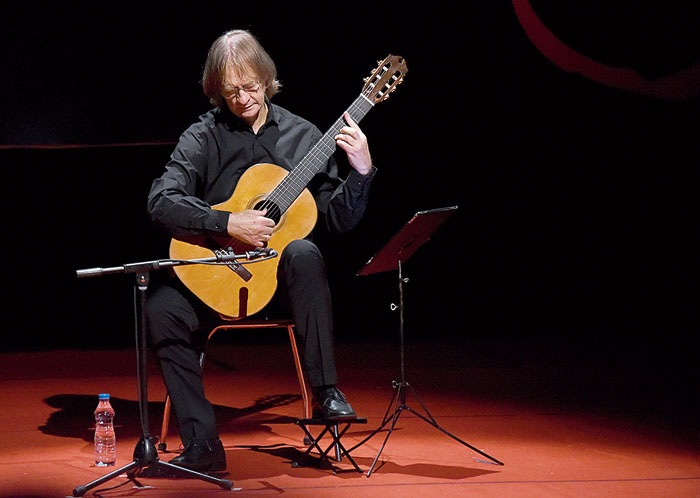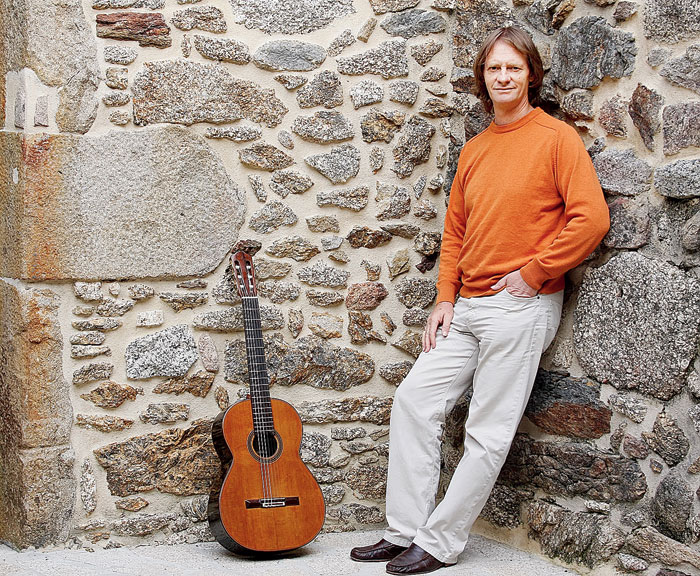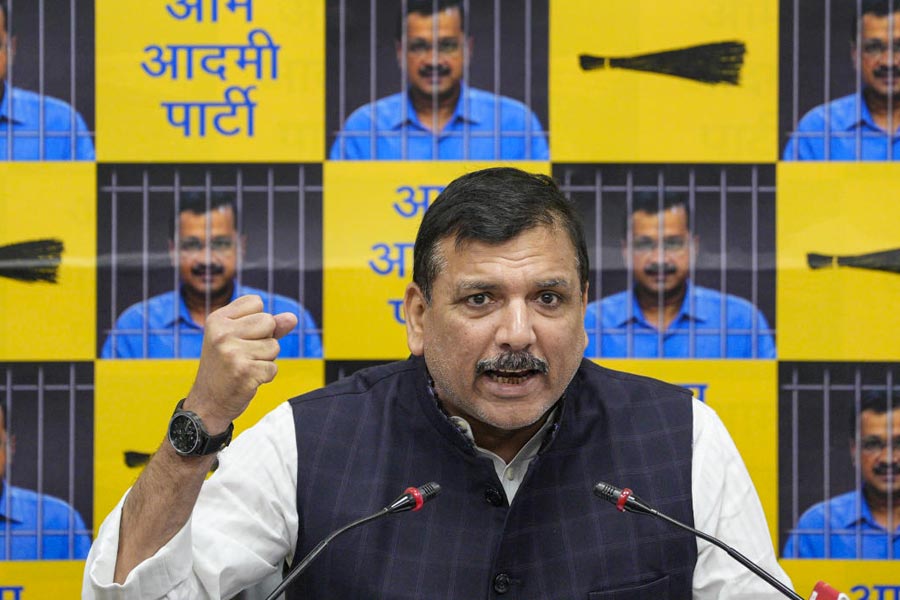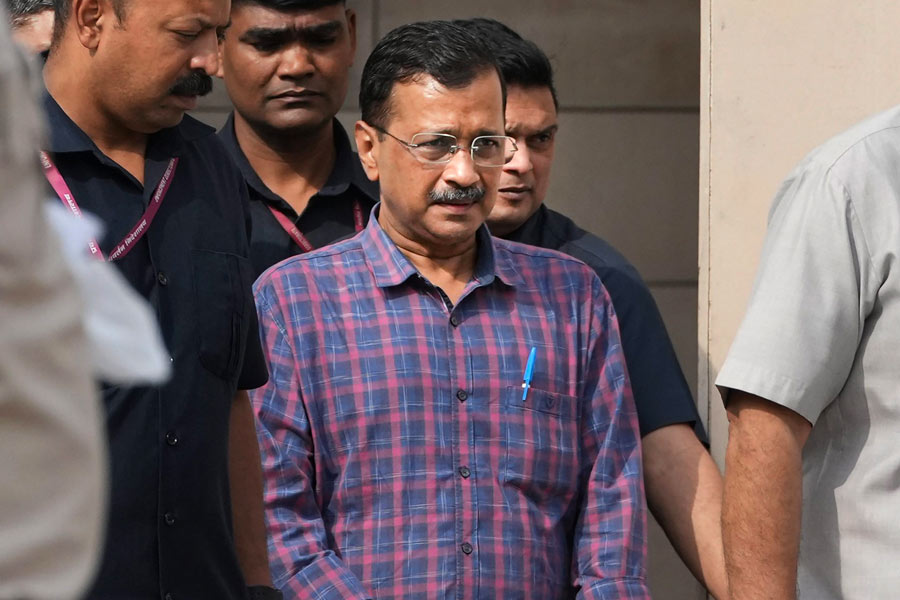If you have ever listened to David Russell perform live, the words “guitar wizard” must have gone through your mind. The UK-based Grammy Award-winning maestro was inspired to play the classical guitar ever since he heard the records of Andres Segovia.
The Telegraph caught up with the man, who has put his faith in Matthias Dammann guitars, at the 10th Calcutta International Classical Guitar Festival & Competition last month. Excerpts.
You have attended the festival in 2013, 2016 and 2019. What are some of the similarities and differences you notice in the classical music scene in Calcutta?
It has, of course, improved. The players have improved, the standard of all the concerts… but also of the students in India. Over the last six or eight years, the students have become much better. The festival is also about making contact with guitarists from all over the world. And for us to come to India is a great pleasure.
You are an avid admirer of Ravi Shankar. How did you come across his music?
I love Indian traditional music of course. Then there is Bollywood and all that... which I also love listening to. I have many CDs of Indian traditional music and, of course, Ravi Shankar’s; it’s something like magic.
Have you ever thought of making a composition with eastern classical influences?
I’m not so good at that. For example, some artistes have done things together with a tabla player. It needs a player who is good at improvising with the style. It’s not something I do very well, so I prefer to do my thing and enjoy listening to Indian music.
What does improvisation mean to you?
When you improvise and mix styles, something new happens and that’s very exciting. But I feel that it needs a special ability which I don’t think I do well. I can do it, but I do it at home (laughs). It’s not something I want to do in public because I have some friends and colleagues and they are wonderful and can do it very well. So if they do it in public, it’s good to listen to. I am much better if I play music by Bach or Fernando Sor.

David Russell in performance at the 10th Calcutta International Classical Guitar Festival & Competition in Calcutta’s ICCR auditorium B. Halder
Your performance looked effortless but was full of emotions. What is normally going through your mind when you’re playing such complex pieces?
I am trying to share the emotion that I think is in the music, I’m trying to share it with you. If I do it well, I am able to give you the feelings that I think are possible in this score, in the music. So my performance is, in some ways, telling a story. So you can tell a story with a flat voice or you can tell a story full of life, it’s still the same story. But one is more interesting than the other. So I try to make the music full of life and to do that, of course, I have to put emotion into it.
Is there ever a worry that classical music might take a back seat?
Not for me (laughs). There is room for all of us and if a line of people want to listen to classical music then we’ll continue to play. If no one comes then maybe we stop, maybe we have to do something else. But there are many people who love listening to classical music and so I don’t think it’s necessary to change. But some players want to change... they want to pursue a different style, which is okay.
Being in the industry for so long, I’m sure you’ve seen many changes....
Yeah! Well, in the industry, where you’re selling CDs and all, classical music has gone down. Not only in guitar but in orchestra, opera... it’s gone down also because people now can take it directly from the Internet and that has been a problem. Also, the pop and rock circuit is huge and there is so much more money... something classical music doesn’t have. So maybe we won’t be such a big thing but it doesn’t really matter because I am happy if 200 people come when I play, it’s fine. In some ways, I don’t need to play at a football field packed with people. But in rock music, that’s what they aim at and maybe do two concerts a year. Whereas we play concerts almost every other week... somewhere. I go wherever people are interested and when it’s in Calcutta, I come to Calcutta (smiles).
So you prefer an intimate interaction with the audience?
Because the guitar is quite an intimate instrument, especially when it’s played by just one person, my way. You can amplify it and make it sound louder but it’s still one person, it’s still quite small. And it’s not like an orchestra or a rock band with videos and stuff. At times I’ve done concerts where they have played visuals of my hand movements, which is good. It helps the audience sitting far away to see more. But it’s still one person, sitting on the stage, sharing music. It’s quite intimate.
How did you discover your tone and balance?
For example, you listen to a famous singer — sometimes you can hear one second of their voice — and say: “I know that person!” That’s what we all want, not only guitarists but violinists and cellists. They want to get a recognisable sound. I don’t think it’s just the tone but it’s also the mixture of how to share the emotion, in the score. What the composer has written is just the blueprint, the performer has to bring it to life. The tone really is the mixture of how the player makes the emotion for the audience. If you have a bad tone (imitates a bad tone) it sounds horrible, but if the tone is reasonable then you’re able to share it and I work really hard to get the tone that I want.

Your fingers have to do a lot of work to get the music out. You need to develop a technique. It’s the same as playing tennis. You can play really badly and have a lot of fun, but if you want to get better, you have to practise
David Russell
We heard that Andres Segovia’s sound helped you in some way to frame your tone.
He was a great guitarist from Spain but, of course, he travelled everywhere. He died as an old man and played all his life. He was a big influence on many guitarists. I met him a few times; I played for him. But his influence was more general, not personal to me. Of course, when he said things to me, it was important because he would be the Ravi Shankar of guitar, the great old master. I remember his words and encouragement very well.
You’ve been dedicated to Matthias Dammann’s guitars since day one? What’s it about the sound of this guitar that stands out?
He’s a very good maker you know. When you choose an instrument, you choose an instrument that does all the things you want. You want something that’s going to be easy to play, it’s strong and also very lyrical if you want it to sound musical. I have many guitars at home, but at concerts I mostly play the Dammann because it’s the best. But who knows, maybe next year someone else will make a better one.
You used to use John Gilbert guitars and then you moved to Dammann because you wanted a darker sound.
That was one of the changes I wanted. We use our sounds as words that might not make sense to non-guitarists. When you say bright sound, it would be sparkly (imitates some bright sounds). Dammann has a more dark sound, a rounder sound. It’s still loud but not so aggressive, so I’ve been very happy with this guitar.
How do you craft your pieces?
Inspiration comes when it comes; you never really know. Most of the time I play music written by other composers because I don’t consider myself a very good composer. I consider myself a good arranger, that is, if you have written something but it’s not for the guitar, maybe I can make it work for the guitar.
The only real compositions that I have done are in Celtic music. My father was a painter and he said that you have to paint every day because you don’t know which day you’ll make something good. So when the inspiration comes and you’re in a restaurant eating, then it’s wasted. So in some ways when you have to compose or when you have to arrange, you have to do it even if you’re not inspired, waiting for the day that something extra happens.
A few tips beginners should keep in mind when they learn to play the classical guitar....
You have to practise. You have to spend a lot of time on any instrument. Your fingers have to do a lot of work to get the music out. You need to develop a technique. It’s the same as playing tennis. You can play really badly and have a lot of fun, but if you want to get better, you have to practise. It’s exactly the same. So you can enjoy playing the guitar without being very good but it’s more fun when you get better. Practising for me is like a ritual, I do it every day. I spend my time enjoying the instrument but also working at making sure that my fingers are more exact or they’re going to the right place and also that I’m remembering my pieces.
It must be easy for you now but is playing classical guitar easy?
Oh, it’s very tough; it’s not an easy instrument. The guitar is easy to play at a low level, like chords and so on. It’s quite difficult to get to the next level. There are other instruments that at the low and medium levels are much easier. Take the piano for example; the learning curve is quicker on a piano but to reach the high level is super difficult. On the guitar, even the medium level is difficult but it’s fun to do. I don’t want to sound discouraging to anybody who enjoys playing. Just spend time with the instrument.










